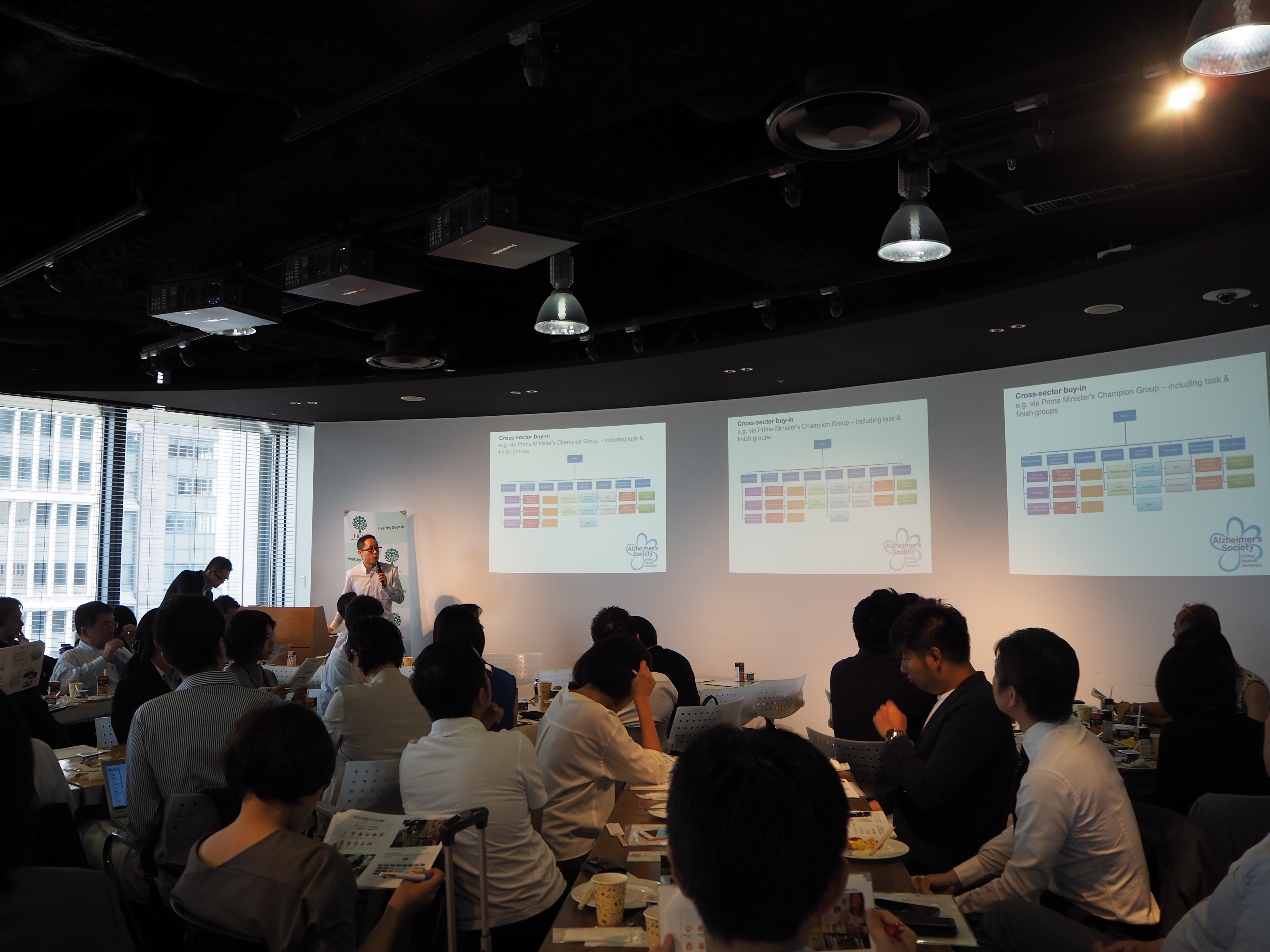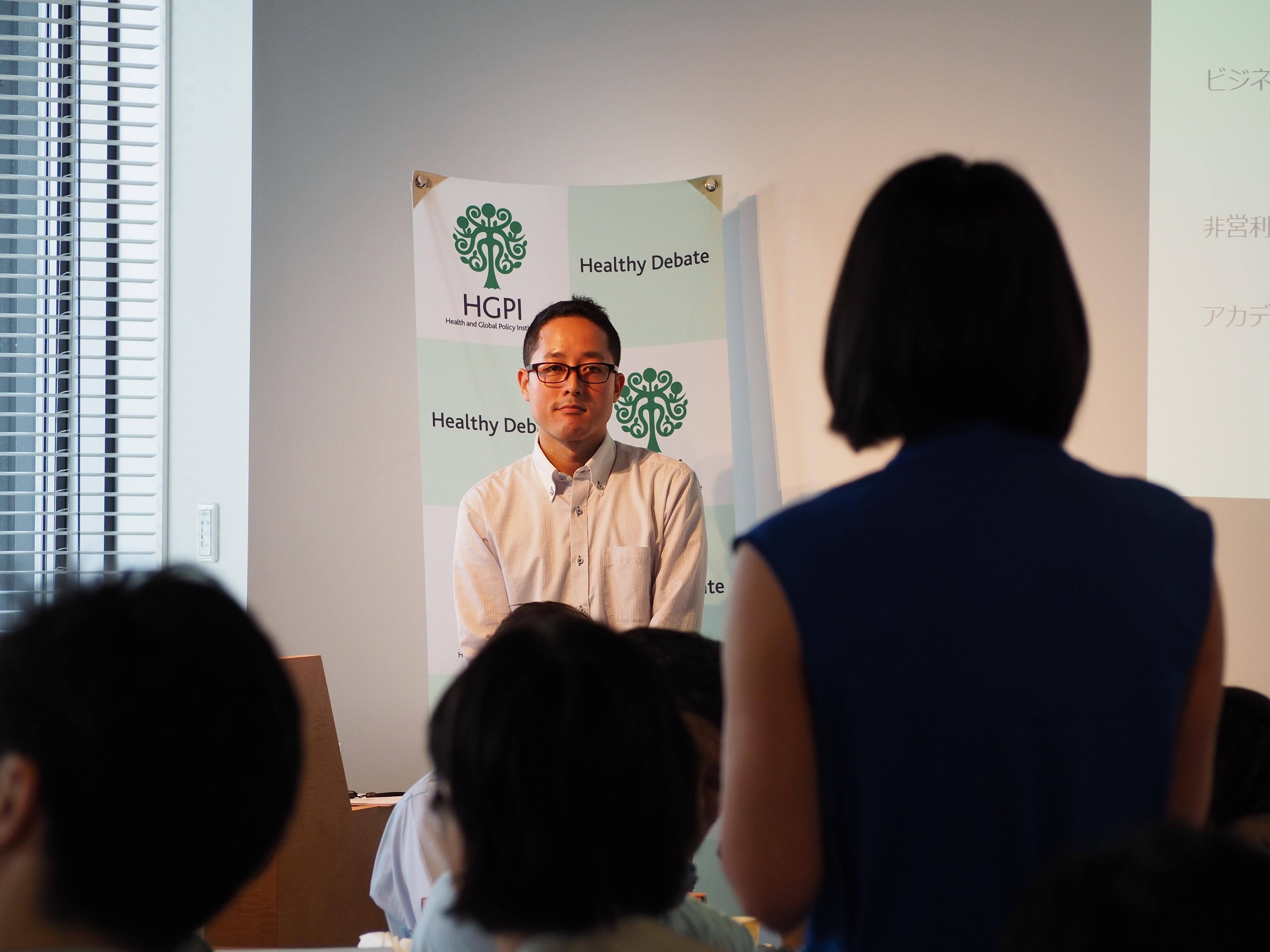[Event Report] The 62nd Breakfast Meeting: “Building a Dementia-Friendly Community ? Expectations for Japan’s National Dementia Strategy and the Role of Stakeholders” (June 22, 2017)
date : 8/20/2017
Tags: Dementia, HGPI Seminar
![[Event Report] The 62nd Breakfast Meeting: “Building a Dementia-Friendly Community ? Expectations for Japan’s National Dementia Strategy and the Role of Stakeholders” (June 22, 2017)](https://hgpi.org/en/wp-content/uploads/sites/2/20170622.jpg)
HGPI invited Mr. Takehito Tokuda, Board member of an NPO, the Dementia Friendship Club, for the 62nd Breakfast Meeting (Moderator: Shunichiro Kurita, HGPI Associate)
At the start of the meeting, Ryoji Noritake, HGPI President, gave a report on the outcomes of a research project on dementia conducted by HGPI, the “Initiative for the Advancement of Dementia Research and Social System Innovation through Global Public Private Partnerships (PPP).”
■Summary of the Event
The number of people suffering from dementia is increasing not only in Japan, but the whole world. There are two fundamental aspects to this problem. One is the decrease in cognitive function experienced by those living with dementia. The other aspect is changes to the environment. Changes to the environment include progress in mechanization, the spread of ICT, the nuclearization of the family, the withering of communal ties, and so on. These changes will cause difficulties in people’s daily lives in the future.
Today’s theme is “Dementia-friendly.” This word encompasses the following notions:
1. Good medical service ? Good care
2. Cooperation between the local communities and specialists
3. Cities that are easy to live in, irrespective of whether someone is living with dementia
“Dementia-friendly Community” initiatives can be classified into two categories. There are “theme-based approaches” based on themes relating to daily life (transportation, finance, distribution and so on), and “community-based approaches” based in individual communities. The important thing is to combine these two approaches well.
Several foreign countries are making progress toward the realization of dementia-friendly communities. The United Kingdom in particular is at the forefront of these efforts. The UK Government defines “Dementia-friendly Community” as “(a community) in which people with dementia are empowered to have high aspirations and feel con?dent, knowing they can contribute and participate in activities that are meaningful to them.” The United Kingdom is promoting efforts toward that end as a nation.
The Alzheimer’s Society of the United Kingdom is promoting the registration and recognition of dementia-friendly communities. The representative platform for this promotional activity is the Dementia Action Alliance. Members of this alliance include various bodies, businesses, and non-governmental organizations that deal with issues related to dementia. In 2013, the local communities participating in this platform comprised 10% of the total of local communities in the whole of England. In 2017, this proportion increased to 75%. In every community, parties concerned with dementia, transportation facilities, libraries, and churches are cooperating to promote the creation of a dementia-friendly community.
On the other hand, there is no clear definition for “Dementia-friendly Communities” in Japan. Although the notion varies depending on the community, the term is used as a generic name for activities that go beyond medical care approaches to seek improvements on the problems accompanying dementia by first understanding their root environmental causes (both social and physical).
When we collated the data from within Japan and abroad it revealed the existence of multiple factors necessary for the realization of a dementia-friendly community. These factors are classified into the four representative domains below:
1. General awareness (eliminating prejudices)
2. Behavioral changes (both individual & occupational)
3. Social capital (relationships / mutual support / hub functionality)
4. Social inclusion (efforts to incorporate the voices of people living with dementia, involve them in society, and socialize with them)
Moving forward, it will be important to work for the realization of these four domains in a balanced manner, rather than trying to develop each domain in isolation.
Cooperation between various stakeholders is necessary for the advancement of efforts to develop the four domains. For example, the public sector should demonstrate leadership by providing support to those living without access to healthcare or welfare. In the business sector, companies should transcend the framework of corporate social responsibility (CSR) and make use of their core businesses to provide support. Examples of such contributions include customer involvement in product development, the formulation of guidelines for business initiatives, and so on. In the non-profit sector, independent networks and organizations are needed that can cooperate on an equal footing with other sectors. Academia, for its part, should proceed with the development and standardization of methods for evidence accumulation and the objective evaluation of activities intended to help create dementia-friendly communities.
During the Q&A session, there was a lively exchange of opinions about Mr. Tokuda’s activities so far, the role he intends to play toward the creation of dementia-friendly communities in the future, and so on.

Lastly, Kiyoshi Kurokawa, HGPI Chairman, gave a closing address. During the address, he commented that, “It is possible for anyone to commit to activities that improve society, including those that work at private companies and other organizations, if they make good use of their time off or work to improve the mindsets about social participation within their organization. It is important that each and every one of us work to resolve the challenges of our communities.”
Top Research & Recommendations Posts
- [Policy Recommendations] The Path to a Sustainable Healthcare System: Three Key Objectives for Public Deliberation (January 22, 2026)
- [Research Report] The 2025 Public Opinion Survey on Healthcare in Japan (March 17, 2025)
- [Research Report] Perceptions, Knowledge, Actions and Perspectives of Healthcare Organizations in Japan in Relation to Climate Change and Health: A Cross-Sectional Study (November 13, 2025)
- [Policy Recommendations] Reshaping Japan’s Immunization Policy for Life Course Coverage and Vaccine Equity: Challenges and Prospects for an Era of Prevention and Health Promotion (April 25, 2025)
- [Research Report] The 2023 Public Opinion Survey on Satisfaction in Healthcare in Japan and Healthcare Applications of Generative AI (January 11, 2024)
- [Research Report] AMR Policy Update #4: Cancer Care and AMR (Part 1)
- [Public Comment Submission] “Assessment Report on Climate Change Impacts in Japan (Draft Overview)” (December 24, 2025)
- [Policy Recommendations] Developing a National Health and Climate Strategy for Japan (June 26, 2024)
- [Research Report] The 2026 Public Opinion Survey on Healthcare in Japan (February 13, 2026)
- [Research Report] The Public Opinion Survey on Child-Rearing in Modern Japan (Final Report) (March 4, 2022)
Featured Posts
-
2026-01-09
[Registration Open] (Hybrid Format) Dementia Project FY2025 Initiative Concluding Symposium “The Future of Dementia Policy Surrounding Families and Others Who Care for People with Dementia” (March 9, 2026)
![[Registration Open] (Hybrid Format) Dementia Project FY2025 Initiative Concluding Symposium “The Future of Dementia Policy Surrounding Families and Others Who Care for People with Dementia” (March 9, 2026)](https://hgpi.org/en/wp-content/uploads/sites/2/dementia-20260309-top.png)
-
2026-02-05
[Registration Open] (Webinar) The 141st HGPI Seminar “Current Status and Future Prospects of Korea’s Obesity Policy: Voices of People with Lived Experience in Policy Promotion” (March 3, 2026)
![[Registration Open] (Webinar) The 141st HGPI Seminar “Current Status and Future Prospects of Korea’s Obesity Policy: Voices of People with Lived Experience in Policy Promotion” (March 3, 2026)](https://hgpi.org/en/wp-content/uploads/sites/2/hs141-top-1.png)






